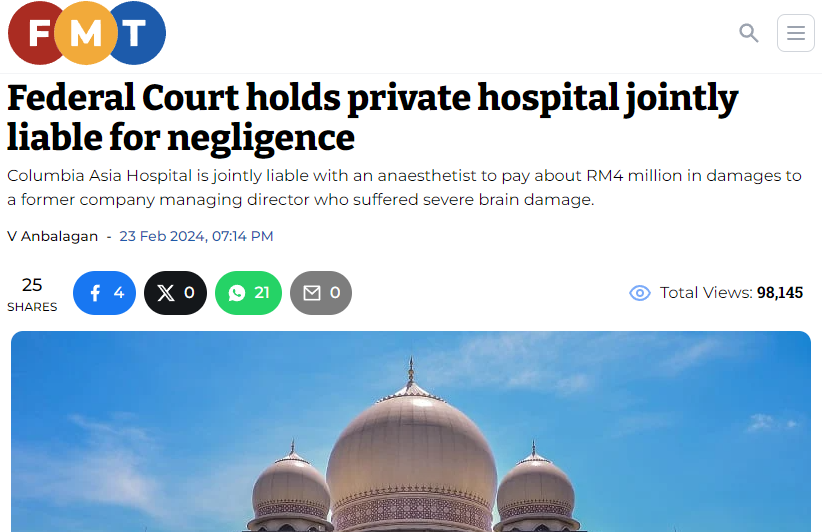In healthcare disputes, liability can extend beyond an individual’s fault. Professionals, including clinic/hospital staff, nurses, assistants, and doctors, may face legal action, resulting in costly compensation payments and legal fees. Medical malpractice insurance offers financial protection by covering predetermined amounts for legal expenses and compensation.
Let’s Get Started!
Testimonials

Dr. Ting
Dentist – Klinik Pergigian Caredent
“Antony is a very responsible agent, each time I have questions to ask regarding my insurance plan, he always reply to my message promptly. He will also introduce me the plan that suits me the most, in terms of the benefits and coverage based on my budget. Read More

Eric Ong
Chiropractor – Spinewell Chiropractic
“Antony’s prompt responses to my inquiries and concerns demonstrated a high level of commitment and professionalism. His extensive knowledge of insurance products and insightful advice made me feel confident in planning my insurance. Read More
Related News

In 2020, a consultant anaesthetist was found liable for damages of RM 1.9 million by the High Court. On appeal, damages against the doctor were raised to RM 3.3 million by the Court of Appeal. It was also found that the doctor had insufficient professional indemnity, and the hospital had a non-delegable duty of care to the patient.

In 2018, Imperial Dental Specialist Centre Sdn Bhd was fined RM320,000 by the Sessions Court in Kuala Lumpur after it was found guilty on five counts with causing the death of former deputy prime minister Ahmad Zahid Hamidi’s son-in-law, Syed Alman Zain Syed Alwi, during a dental treatment there.
FAQ
1. What are the coverage limits?
Different occupations and experience levels require different coverage. Some high-risk occupations mandate minimum coverage (eg. RM 1,000,000 and above), while others offer a range of options (eg. RM 250,000, RM 500,000 and above). Let’s discuss your specific needs.
2. How is the premium determined?
The insurance company calculates premiums based on coverage, duration, and your expertise in the field or the work involved.
3. Are there different policy options available?
Yes, tailored quotes are available. Let’s discuss a customized plan.
4. Do we really need higher coverage?
The policy covers defense costs against lawsuits or complaints, which can extend for years, incurring significant expenses. Each medical malpractice claim is unique, influenced by an individual’s health, career, and resources, making exact calculations impossible.
Damages can be categorized into Economic (Past & Future) and Non-Economic. Economic damages cover medical expenses, future earnings, and family income loss due to permanent disability. Non-economic damages, like pain and suffering, are harder to quantify but require a reasonable and justifiable demand.
Starting with lower coverage due to affordability is fine. However, as one progresses, especially into higher-risk work like surgeries, considering higher coverage is wise. Patient volume and catering to high-income patients are also factors to consider for higher coverage needs.
5. Will there coverage cover my previous work?
Yes, the insurance policy covers disputes related to previous work that arise during the policy period. However, if a dispute was known prior to purchasing the policy, it will not be covered.
6. Can I pause my policy for a year or two?
Yes, but you risk liability for disputes during the non-covered period. Remember, patients have up to 6 years to challenge the treatment/services.
7. Are there mandatory requirements for medical malpractice insurance by the regulatory body?
Yes and registration with Malaysia’s relevant regulatory body is necessary. You can find these requirements outlined on related websites.
8. Can coverage be customized for specific practice needs or specialties?
Absolutely, premiums are based on coverage and the nature of your work.
9. What if I change practices or locations?
The policy covers disputes arising from your work and extends across multiple establishments, as long as each establishment is registered.
10. What if I retire or leave the profession?
Maintaining the policy for 6 years is advisable as patients have 6 years to challenge the treatment/services. If you have switched to an advisory roles or lecturing work, you can adjust your occupation.
11. Can I add insured parties or staff under the policy?
Yes, it’s possible to include nurses, assistants, and other medical staff in the establishment policy to share coverage. However, it’s advisable for doctors to obtain their individual insurance as both the establishment and doctors can be jointly liable in certain cases.
12. If my employer provides coverage, should I skip personal insurance?
It’s crucial to have your own insurance for a few important reasons. Sometimes, healthcare disputes take a long time to sort out. If you’re looking to switch to a new workplace during an ongoing dispute, your current employer might not allow you to use their insurance.
Also, it’s essential to check if the insurance covers everyone or just the establishment. If both the staff and the establishment need defense and have to compensate the patient at the same time, there might not be enough insurance money for everyone involved. In such cases, bosses often prioritize their own interests first.
Having personal insurance gives you your own protection, especially in tricky situations or when changing workplaces.
13. Can I get short-term coverage?
The insurance policy is typically renewed annually. However, if you start the policy midway through the year, the insurance company offers prorated premiums. This means that if you apply for insurance on a date like February 1st, your coverage will start from February 2nd of that year and continue until December 31st. Similarly, if you initiate the policy on July 1st, the coverage begins from July 2nd of that year and runs until December 31st of the following year, aligning with the APC renewal.
14. Can I increase coverage mid-period?
You can, but newly added coverage is usually excluded from immediate claims. Consider changes during renewal.
15. Should I get an establishment policy if I have personal insurance?
For larger establishments or multiple branches, separate coverage is advisable. For smaller clinics (sole practitioner), personal insurance might sufficient, but it’s your call.
16. I am a government doctor with locum exposure. Can I obtain coverage solely for my locum work?
Regrettably, our policy doesn’t offer coverage solely for locum work. The insurance is designed to cover disputes arising from all your professional activities, including your work in government establishments.
Being a government doctor with locum exposure is considered a single occupation under our policy. Although the government might cover your work within its establishments, distinguishing between your government and private work poses a challenge for the insurance company.
Moreover, the insurance company views this as a different risk due to factors like longer working hours and a higher number of patients. These conditions can escalate the likelihood of malpractice or disputes. Consequently, it becomes impractical to segregate the two types of work for insurance coverage.
17. Will the policy cover if the dispute doesn’t go to court?
Yes, the policy covers situations where legal defense is necessary, even if the dispute doesn’t escalate to court. However, each case may vary, so it’s advisable to consult with a lawyer. They’ll guide you and the insurance company regarding the claim’s specifics.
18. Is there any claim experience?
Yes, I recently handled a claim that lasted for 2 years. A patient filed a complaint against a dentist, alleging unprofessional conduct to the dental council. The insurance company initiated the claim and assigned lawyers to defend the dentist. After multiple hearings, the dental council found no fault and didn’t require compensation from the dentist. The case was closed, and the insurance company covered the lawyer fees.
19. Can I take legal action against a patient (plaintif) for defamation?
Under this insurance policy, it’s meant to defend you (the policyholder) and offer financial protection in such situations. If you wishes to counter-sue or take legal action, it’s recommended to consult with a lawyer to assess the feasibility of pursuing such actions.
20. The claim process – how does it work?
Please notify the insurance company or the agent when you receive a lawyer letter from a patient or a notification from an authority (dental council or medical council etc) regarding a complaint. The insurance company will recommend lawyers from their panel. In order to get the best results, you will have to engage the lawyers and select the attorneys you wish to work with. Your lawyer will then follow up on your case after you’ve signed an appointment letter.
Important Notes:
- It is important to note that the insurance company will not assign a lawyer to you because they want to give you the flexibility to choose a lawyer you feel comfortable working with. Make sure you do your due diligence and speak to the lawyer to determine who you want to work with.
- The insurance company cannot control how the law firms operate, so some law firms will not go the extra mile to help you communicate with the insurance company and facilitate the claim. As soon as you learn about this, discuss how you would like to proceed with the agent.
- Regardless of whether it is a hearing with the authorities, you should consult a lawyer to ensure that your best interests are represented. A lawyer may not be able to help you when the entire situation becomes to your disadvantage after multiple hearings. Losing the case will not only result in possible compensation to the patient, but it may also impact your license.
Disclaimer: Please note that information regarding regulations, product features, and claim scenarios may change over time. Additionally, the examples provided are for reference purposes only and do not guarantee claim approval, as each claim situation is unique. Therefore, the information presented here should be used as a reference guide and does not constitute binding advice or assurance of claim outcomes.